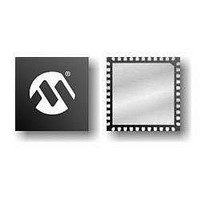PIC16F1937-E/MV Microchip Technology, PIC16F1937-E/MV Datasheet - Page 214

PIC16F1937-E/MV
Manufacturer Part Number
PIC16F1937-E/MV
Description
14KB Flash, 512B RAM, 256B EEPROM, LCD, 1.8-5.5V 40 UQFN 5x5x0.5mm TUBE
Manufacturer
Microchip Technology
Series
PIC® XLP™ 16Fr
Datasheet
1.PIC16F1937-EMV.pdf
(472 pages)
Specifications of PIC16F1937-E/MV
Processor Series
PIC16F
Core
PIC
Program Memory Type
Flash
Program Memory Size
14 KB
Data Ram Size
256 B
Interface Type
MI2C, SPI, EUSART
Number Of Timers
5
Operating Supply Voltage
1.8 V to 5.5 V
Maximum Operating Temperature
+ 125 C
Mounting Style
SMD/SMT
Package / Case
UQFN-40
Development Tools By Supplier
MPLAB IDE Software
Minimum Operating Temperature
- 40 C
Core Processor
PIC
Core Size
8-Bit
Speed
32MHz
Connectivity
I²C, LIN, SPI, UART/USART
Peripherals
Brown-out Detect/Reset, LCD, POR, PWM, WDT
Number Of I /o
36
Eeprom Size
256 x 8
Ram Size
512 x 8
Voltage - Supply (vcc/vdd)
1.8 V ~ 5.5 V
Data Converters
A/D 14x10b
Oscillator Type
Internal
Operating Temperature
-40°C ~ 125°C
Lead Free Status / Rohs Status
Details
- Current page: 214 of 472
- Download datasheet (5Mb)
PIC16(L)F1934/6/7
23.2
The Compare mode function described in this section
is available and identical for CCP modules ECCP1,
ECCP2, ECCP3, CCP4 and CCP5.
Compare mode makes use of the 16-bit Timer1
resource. The 16-bit value of the CCPRxH:CCPRxL
register pair is constantly compared against the 16-bit
value of the TMR1H:TMR1L register pair. When a
match occurs, one of the following events can occur:
• Toggle the CCPx output
• Set the CCPx output
• Clear the CCPx output
• Generate a Special Event Trigger
• Generate a Software Interrupt
The action on the pin is based on the value of the
CCPxM<3:0> control bits of the CCPxCON register. At
the same time, the interrupt flag CCPxIF bit is set.
All Compare modes can generate an interrupt.
Figure 23-2
Compare operation.
FIGURE 23-2:
23.2.1
The user must configure the CCPx pin as an output by
clearing the associated TRIS bit.
Also, the CCPx pin function can be moved to
alternative pins using the APFCON register. Refer to
Section 12.1 “Alternate Pin Function”
details.
DS41364E-page 214
Note:
CCPx
Pin
Output Enable
TRIS
Compare Mode
CCP PIN CONFIGURATION
Clearing the CCPxCON register will force
the CCPx compare output latch to the
default low level. This is not the PORT I/O
data latch.
shows a simplified diagram of the
Q
Special Event Trigger
CCPxM<3:0>
R
S
Mode Select
Output
COMPARE MODE
OPERATION BLOCK
DIAGRAM
Logic
Set CCPxIF Interrupt Flag
4
(PIRx)
Match
CCPRxH CCPRxL
TMR1H
Comparator
for more
TMR1L
23.2.2
In Compare mode, Timer1 must be running in either
Timer mode or Synchronized Counter mode. The
compare operation may not work in Asynchronous
Counter mode.
See
for more information on configuring Timer1.
23.2.3
When Generate Software Interrupt mode is chosen
(CCPxM<3:0> = 1010), the CCPx module does not
assert control of the CCPx pin (see the CCPxCON
register).
23.2.4
When Special Event Trigger mode is chosen
(CCPxM<3:0> = 1011), the CCPx module does the
following:
• Resets Timer1
• Starts an ADC conversion if ADC is enabled
The CCPx module does not assert control of the CCPx
pin in this mode.
The Special Event Trigger output of the CCP occurs
immediately upon a match between the TMR1H,
TMR1L register pair and the CCPRxH, CCPRxL regis-
ter pair. The TMR1H, TMR1L register pair is not reset
until the next rising edge of the Timer1 clock. The
Special Event Trigger output starts an A/D conversion
(if the A/D module is enabled). This allows the
CCPRxH, CCPRxL register pair to effectively provide a
16-bit programmable period register for Timer1.
TABLE 23-3:
Refer to
more information.
Note:
Note 1: The Special Event Trigger from the CCP
PIC16(L)F1934/6/7
Section 21.0 “Timer1 Module with Gate Control”
2: Removing
Section 15.2.5 “Special Event
Device
TIMER1 MODE RESOURCE
Clocking Timer1 from the system clock
(F
mode. In order for Compare mode to
recognize the trigger event on the CCPx
pin, TImer1 must be clocked from the
instruction clock (F
external clock source.
SOFTWARE INTERRUPT MODE
SPECIAL EVENT TRIGGER
module does not set interrupt flag bit
TMR1IF of the PIR1 register.
changing the contents of the CCPRxH
and CCPRxL register pair, between the
clock edge that generates the Special
Event Trigger and the clock edge that
generates
preclude the Reset from occurring.
OSC
) should not be used in Compare
SPECIAL EVENT TRIGGER
2008-2011 Microchip Technology Inc.
the
the
match
Timer1
OSC
CCPx/ECCPx
/4) or from an
CCP5
condition
Reset,
Trigger”for
will
by
Related parts for PIC16F1937-E/MV
Image
Part Number
Description
Manufacturer
Datasheet
Request
R

Part Number:
Description:
IC, 8BIT MCU, PIC16F, 32MHZ, SOIC-18
Manufacturer:
Microchip Technology
Datasheet:

Part Number:
Description:
IC, 8BIT MCU, PIC16F, 32MHZ, SSOP-20
Manufacturer:
Microchip Technology
Datasheet:

Part Number:
Description:
IC, 8BIT MCU, PIC16F, 32MHZ, DIP-18
Manufacturer:
Microchip Technology
Datasheet:

Part Number:
Description:
IC, 8BIT MCU, PIC16F, 32MHZ, QFN-28
Manufacturer:
Microchip Technology
Datasheet:

Part Number:
Description:
IC, 8BIT MCU, PIC16F, 32MHZ, QFN-28
Manufacturer:
Microchip Technology
Datasheet:

Part Number:
Description:
IC, 8BIT MCU, PIC16F, 32MHZ, QFN-28
Manufacturer:
Microchip Technology
Datasheet:

Part Number:
Description:
IC, 8BIT MCU, PIC16F, 32MHZ, SSOP-20
Manufacturer:
Microchip Technology
Datasheet:

Part Number:
Description:
IC, 8BIT MCU, PIC16F, 20MHZ, DIP-40
Manufacturer:
Microchip Technology
Datasheet:

Part Number:
Description:
IC, 8BIT MCU, PIC16F, 32MHZ, QFN-28
Manufacturer:
Microchip Technology
Datasheet:

Part Number:
Description:
IC, 8BIT MCU, PIC16F, 20MHZ, MQFP-44
Manufacturer:
Microchip Technology
Datasheet:

Part Number:
Description:
IC, 8BIT MCU, PIC16F, 20MHZ, QFN-20
Manufacturer:
Microchip Technology
Datasheet:

Part Number:
Description:
IC, 8BIT MCU, PIC16F, 32MHZ, QFN-28
Manufacturer:
Microchip Technology
Datasheet:

Part Number:
Description:
MCU 14KB FLASH 768B RAM 64-TQFP
Manufacturer:
Microchip Technology
Datasheet:

Part Number:
Description:
7 KB Flash, 384 Bytes RAM, 32 MHz Int. Osc, 16 I/0, Enhanced Mid Range Core, Low
Manufacturer:
Microchip Technology

Part Number:
Description:
14KB Flash, 512B RAM, 256B EEPROM, LCD, 1.8-5.5V 40 UQFN 5x5x0.5mm TUBE
Manufacturer:
Microchip Technology










